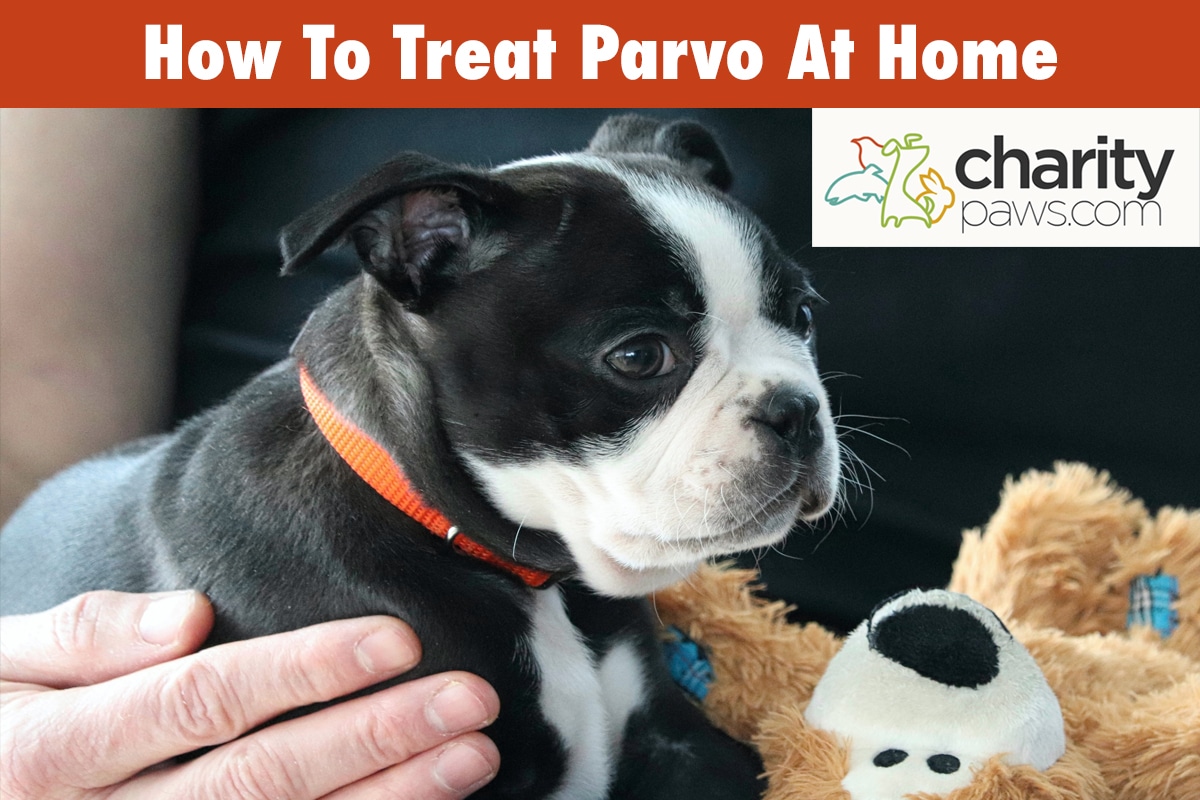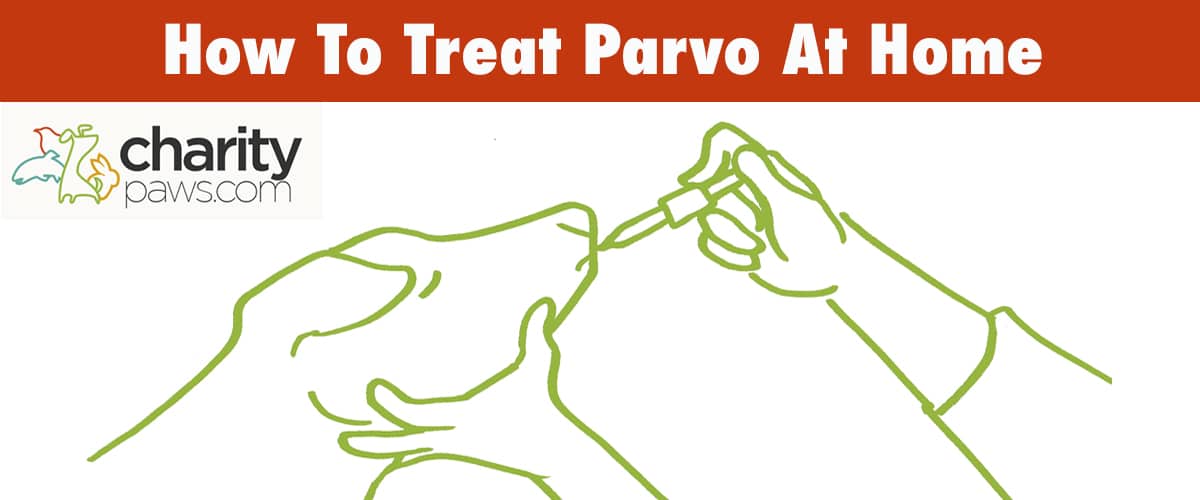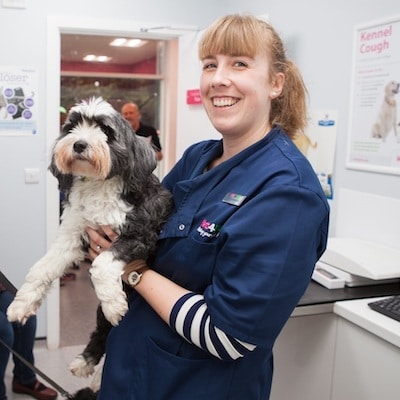If your dog is with suspected canine parvovirus, then it can be a worrying time.
You might be tempted to see if you can treat your dog yourself at home, especially if you have concerns about your vet bill.
How do you treat parvo at home if you cannot afford the vet?
For most people, sadly this issue can cause their puppy to die.
Read on to find out more about parvo, as well as what you can do to help your dog.
What Is Parvo In Dogs?
Parvo is a shortened name that many people use for canine parvovirus, which can also be known as CPV or CPV2.
This virus is highly contagious between dogs usually from coming into contact with contaminated fecal material, or an infected environment.
It can also be transferred via objects like shoes, clothing, food bowls, and toys.
The virus can affect any dog, but it is most often seen in young, unvaccinated puppies.
It attacks rapidly dividing cells such as those in the intestines (guts), causing digestive upset.
Because of this, it can also affect fetuses and newborns.
Parvo can live for many months in the environment waiting to meet the next dog.
Once it has been caught the virus multiplies in the digestive tract, causing clinical symptoms and being shed into the environment in large numbers via your dog’s feces.
According to one study, some breeds seem more susceptible to parvovirus than others.
These include:
- Rottweilers
- Doberman Pinschers
- English Springer Spaniels

What Are The Symptoms Of Parvo?
The symptoms of parvo are as follows:
- Diarrhea, which is often bloody
- Vomiting
- Lethargy
- Fever
- Reduced appetite
- Dehydration
- Collapse
- Death due to loss of bodily fluids and/or secondary bacterial infection (septicemia)
How Is Parvovirus Diagnosed?
Your vet will start by examining your dog and talking to you about the symptoms you have seen at home.
They may then suggest some further tests.
To diagnose parvovirus your vet will take a swab of fecal material.
This can then be analyzed for the virus, usually by using an in-house SNAP test which gives a positive or negative result within a few minutes.
This patient-side test is very handy as it gives a diagnosis almost right away.
Do not worry if your vet doesn’t have access to SNAP tests, the sample can be sent to the lab for analysis instead and treatment can still be started based on your dog’s symptoms.
The results can be a bit trickier to interpret if your puppy has been recently vaccinated though, as some vaccines will result in puppies passing some virus particles in their stools for up to 4 weeks post-injection, giving a positive result on in-house tests.
Your vet might also need to suggest some other tests too, like blood profiles to check for markers of dehydration, anemia, inflammation, and perhaps diagnostic imaging to rule out other conditions.
What Is The Treatment For Parvo?

There is no specific cure for parvovirus, instead, treatment is usually aimed at treating the symptoms of digestive upset and dehydration.
Your vet will usually recommend intravenous fluid therapy, which involves your dog being hospitalized on a drip.
This will correct any dehydration but also make sure his fluid intake is kept stable while he is dealing with his vomiting and diarrhea.
Fluids delivered in this way will also help to correct any electrolyte imbalances.
Young dogs and puppies are particularly susceptible to the effects of severe vomiting and diarrhea so they can suffer from low potassium levels and low blood sugar.
Antibiotics are also required for successful treatment.
Although the disease is caused by a virus, when the intestines become damaged the dog is at higher risk of secondary bacterial infections.
Bacteria can leak from the gut contents through the inflamed intestines and into the bloodstream causing septicemia.
Medication can be given to help counteract vomiting too.
This can help make your dog feel better and less nauseous, but will also mean they can keep some food down providing important nutrients to help fight their illness.
Some dogs will need feeding via a nasal feeding tube or a stomach tube if they are struggling to take food orally.
Anti-viral medications called interferons can be used in some cases, helping to improve survival rates according to this study.
This medication can be costly though and may not be stocked by all vets.
During their stay in the hospital, your dog will be barrier nursed.
This means that veterinary staff will have to wear protective clothing such as aprons and gloves, to try and stop the spread of the virus to other dogs in their care.
Can Parvo Be Treated At Home?
The short answer is that it’s not advisable.
Parvovirus can be fatal and so most dogs do best when they receive prompt supportive care from a veterinarian.
You can see from the treatment section (above), that there are various medications that your vet might use to treat parvovirus, all of which will be prescription medications obtained only under the direction of a vet.
However, for some owners, the cost of treating parvovirus can be quite a worrying prospect so it’s understandable that you will be reading articles like this for tips and advice on how to self-manage things.
It is important to realize that treating your dog at home will lead to much lower success rates than hospitalization, with death being a potential outcome.
If you are determined for your pet not to be hospitalized, then speak to your vet and they will help guide you through your options.
How To Care For A Puppy With Parvo At Home
You will still need to take your puppy to your veterinarian for an initial physical exam and diagnosis.
There are many different causes for stomach upsets, not just parvovirus.
If your vet confirms the diagnosis with a fecal sample they will then be able to recommend the best course of treatment.
If your pet is severely dehydrated, then hospitalization will be strongly advised.
It is unlikely you will be able to correct severe dehydration through oral fluids, especially if they are still losing liquid through vomiting and diarrhea.
In some cases, subcutaneous fluids can be administered at home as an alternative, but this is still suboptimal compared to fluid directly into the bloodstream.
Your vet will be able to talk you through the process of administering subcutaneous fluids, but usually involves inserting a needle into your puppy’s skin and running fluids into the space there.
Those fluids will be absorbed slowly by your dog into their system.
Your vet may be able to administer some initial injections to start your puppy off with antibiotics and antinausea therapies, which you might be able to then continue orally via tablets at home (if your pup can keep things down).
Feeding small amounts of bland, easy-to-digest food at a time is best for dogs with severe digestive upset.
Cooked chicken or white fish, with boiled rice, can be helpful or a prescription sensitive stomach food.
Probiotics may be helpful too, as they can help replenish some good gut bacteria.
You must isolate your puppy from other dogs during his illness as he will be contagious.
So, to some extent, it depends on how unwell your puppy is as to whether home treatment is feasible or not.
Just be prepared that your dog’s outcome will be less favorable at home, and you could risk his life by not following your vet’s recommendations for hospitalization.
Are There Any Home Remedies To Treat Parvo?
No, there are no proven home remedies to treat parvo.
Any supplements or home remedies you read about online, are not based on scientific evidence.
They may be useful in helping treat milder gastrointestinal infections, but should not be used alone in a confirmed case of parvo.
Your dog will require prescription medications to give him the best chance of survival.
Can You Treat Parvo Without A Vet?
If you are treating a tummy upset in your puppy without a diagnosis from your vet, then bear in mind you may not be dealing with parvo.
Other illnesses such as intestinal obstructions or hemorrhagic gastroenteritis (HGE) could cause similar symptoms, plus there are an array of milder stomach complaints your pup could be suffering from.
So, it’s always best to involve your vet to be sure.
If your dog has been officially diagnosed with parvovirus then you should be following your vet’s advice regarding treatment.
Trying to treat your puppy yourself could mean a poor outcome.
Never at any point be tempted to give your dog your own medications to treat them.
You could risk making things much worse if you accidentally get the doses wrong.
How Can I Prevent My Dog From Getting Parvo?
Vaccination is the number one thing you can do to protect your dog against parvovirus.
When your puppy is very young, they will get some immunity from antibodies in their mother’s milk.
Making sure that breeding dogs have been vaccinated against this disease is important.
These antibodies will start to wane over time with puppies over 6 weeks of age being more at risk of infection.
During this time your young puppy should not be going out in public or mixing with other dogs.
Your vet will usually start routine vaccinations from 8 weeks of age onward, but it is possible to give an earlier dose of parvovirus vaccine at 6 weeks of age.
Speak to your vet about their clinic’s protocols for the parvo vaccine.
Make sure your puppy attends all his vaccination appointments to ensure he gets full immunity against this virus.
Do not be tempted to take him out and about before these vaccinations.
Once your pup has had his primary course of vaccines, he will then have booster injections at regular intervals for the rest of his life to ensure his immunity doesn’t become too low.
Conclusion
Parvovirus can be fatal and should always be taken seriously.
If your pup is diagnosed with this condition then you should follow your veterinarian’s advice and treatment plan to try and give your dog the best chance possible.
If you are unable to afford this then speak to your vet openly, about your options.
They might be able to suggest therapies you can try at home, or perhaps their hospital has a payment plan that might help you with your unexpected bill.
Please do not risk causing suffering to your dog, always include your vet, rather than googling home remedies.
FAQs
How do I treat my dog at home for parvo?
The simple answer is do not treat your dog at home for parvo!
Always take your dog to a vet for a diagnosis and follow their treatment recommendations.
If you have financial concerns then do not be afraid to tell your vet, so that they can explore different options with you.
How to get rid of parvo?
This virus is quite tough and can persist in the outdoor environment for several months.
Chlorine bleach is quite effective compared to other disinfectants but it is impossible to treat all of the grass and dirt in your yard in this way.
Potassium peroxymonosulfate can be useful to spray on infected areas like this, otherwise consider the yard contaminated for at least 7 months and a risk to unvaccinated dogs.
Can my dog survive parvo without a vet?
It is possible, but his chances of survival are much lower than if he was in the care of a veterinarian.
Young dogs can become unwell very quickly, and many die without intravenous fluids and other treatments like antibiotics.

